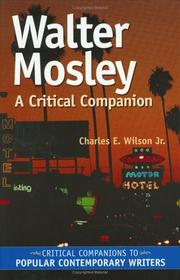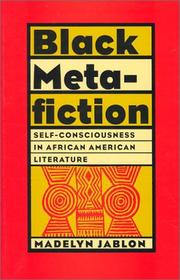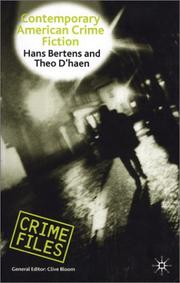| Listing 1 - 8 of 8 |
Sort by
|

ISBN: 1282040367 9786612040368 1847600425 9781847600424 661204036X 9780313320224 0313320225 9781282040366 Year: 2007 Publisher: Penrith
Abstract | Keywords | Export | Availability | Bookmark
 Loading...
Loading...Choose an application
- Reference Manager
- EndNote
- RefWorks (Direct export to RefWorks)
Mosley, Walter. --- Mosley, Walter --- Criticism and interpretation.
Book
ISBN: 9781611177022 1611177022 9781611177015 1611177014 Year: 2016 Publisher: Columbia
Abstract | Keywords | Export | Availability | Bookmark
 Loading...
Loading...Choose an application
- Reference Manager
- EndNote
- RefWorks (Direct export to RefWorks)
Walter Mosley is perhaps best known for his first published mystery, Devil in a Blue Dress, which became the basis for the 1995 movie of the same name featuring Denzel Washington. Mosley has since written more than forty books across an impressive expanse of genres including, but not limited to, nonfiction, science fiction, drama, and even young adult fiction, garnering him many honors including an O'Henry Award, an Anisfield-Wolf Book Award, a Grammy Award, a Pen Center Lifetime Achievement Award, and two NAACP Image Awards for Outstanding Literary Work in Fiction. In Understanding Walter Mosley, Jennifer Larson considers Mosley's corpus as a whole to help readers more fully understand the evolution of his literary agenda. All Mosley's texts feature his trademark accessibility as well as his penchant for creating narratives that both entertain and instruct. Larson examines how Mosley's writing interrogates, complicates, and contextualizes recurring moral, social, and even personal questions. She also considers the possible roots of Mosley's enduring popularity with a diverse group of readers. Larson then traces key themes and claims throughout the Easy Rawlins series to show how Mosley's beloved hero offers unique perspectives on race, class, and masculinity in the mid- to late twentieth century; explores the ways in which Fearless Jones, Mosley's second detective, both builds on and diverges from his predecessor's character; and looks at how the works featuring Leonid McGill, Mosley's junior detective, center on understanding the complex relationship between present-day social dilemmas and the personal as well as the communal past. Regarding Mosley's other genres, Larson argues that the science fiction works together portray a future in which race, class, and gender are completely reimagined, yet still subject to an oppressive power dynamic, while his erotica asks readers to reconsider the dynamics of power and control but in a more personal, even intimate, context. Similarly, in Mosley's nongenre fiction, stories are revived through a reconnection with the past, a reclaiming of cultural heritage and lineage, and a rejection of classist visions of power. Finally, Mosley's nonfiction, which persuades his audience to act through writing, humanitarian efforts, or social uprising, offers a mix of lessons aimed at guiding readers through the same questions that inform his fiction writing.
Book
Year: 2016 Publisher: Baltimore, Maryland : Baltimore, Md. : Project Muse, Project MUSE,
Abstract | Keywords | Export | Availability | Bookmark
 Loading...
Loading...Choose an application
- Reference Manager
- EndNote
- RefWorks (Direct export to RefWorks)
Walter Mosley is perhaps best known for his first published mystery, Devil in a Blue Dress, which became the basis for the 1995 movie of the same name featuring Denzel Washington. Mosley has since written more than forty books across an impressive expanse of genres including, but not limited to, nonfiction, science fiction, drama, and even young adult fiction, garnering him many honors including an O'Henry Award, an Anisfield-Wolf Book Award, a Grammy Award, a Pen Center Lifetime Achievement Award, and two NAACP Image Awards for Outstanding Literary Work in Fiction. In Understanding Walter Mosley, Jennifer Larson considers Mosley's corpus as a whole to help readers more fully understand the evolution of his literary agenda. All Mosley's texts feature his trademark accessibility as well as his penchant for creating narratives that both entertain and instruct. Larson examines how Mosley's writing interrogates, complicates, and contextualizes recurring moral, social, and even personal questions. She also considers the possible roots of Mosley's enduring popularity with a diverse group of readers. Larson then traces key themes and claims throughout the Easy Rawlins series to show how Mosley's beloved hero offers unique perspectives on race, class, and masculinity in the mid- to late twentieth century; explores the ways in which Fearless Jones, Mosley's second detective, both builds on and diverges from his predecessor's character; and looks at how the works featuring Leonid McGill, Mosley's junior detective, center on understanding the complex relationship between present-day social dilemmas and the personal as well as the communal past. Regarding Mosley's other genres, Larson argues that the science fiction works together portray a future in which race, class, and gender are completely reimagined, yet still subject to an oppressive power dynamic, while his erotica asks readers to reconsider the dynamics of power and control but in a more personal, even intimate, context. Similarly, in Mosley's nongenre fiction, stories are revived through a reconnection with the past, a reclaiming of cultural heritage and lineage, and a rejection of classist visions of power. Finally, Mosley's nonfiction, which persuades his audience to act through writing, humanitarian efforts, or social uprising, offers a mix of lessons aimed at guiding readers through the same questions that inform his fiction writing.

ISBN: 0877455600 Year: 1997 Publisher: Iowa City University of Iowa Press
Abstract | Keywords | Export | Availability | Bookmark
 Loading...
Loading...Choose an application
- Reference Manager
- EndNote
- RefWorks (Direct export to RefWorks)
Fiction --- Thematology --- American literature --- African Americans in literature --- Afro-Americans in literature --- Afro-Amerikanen in de literatuur --- Afro-Américains dans la littérature --- Amerikaanse zwarten in de literatuur --- Black Americans in literature --- Conscience de soi dans la littérature --- Negroes in literature --- Noirs américains dans la littérature --- Self-consciousness in literature --- Zelfbewustzijn in de literatuur --- Zwarte Amerikanen in de literatuur --- American fiction --- African American authors --- History and criticism --- 20th century --- Experimental fiction [American ] --- Johnson, Charles Richard --- Walker, Alice --- Dove, Rita --- Gaines, Ernest J. --- Morrison, Toni --- Flowers, Arthur --- Sherman, Charlotte Watson --- Forrest, Leon --- Mosley, Walter --- Butler, Octavia E.

ISBN: 0333674553 0333684656 Year: 2001 Volume: *1 Publisher: Basingstoke New York Palgrave
Abstract | Keywords | Export | Availability | Bookmark
 Loading...
Loading...Choose an application
- Reference Manager
- EndNote
- RefWorks (Direct export to RefWorks)
Fiction --- American literature --- anno 1900-1999 --- Crime dans la litterature --- Crime in literature --- Criminals in literature --- Criminels dans la littérature --- Misdaad in de literatuur --- Misdadigers in literatuur --- Academic collection --- Crime dans la littérature --- American fiction --- Detective and mystery stories, American --- History and criticism --- Detective and mystery stories [American ] --- 20th century --- Parker, Robert Brown --- Criticism and interpretation --- Mosley, Walter --- Muller, Marcia --- Grafton, Sue --- Paretsky, Sara --- Kaminsky, Stuart --- Block, Lawrence --- Forrest, Katherine V. --- Barr, Nevada --- Hightower, Lynn S. --- Ellroy, James --- Connelly, Michael --- Grimes, Martha --- George, Elizabeth --- Walker, Mary Willis --- Cornwell, Patricia --- Furutani, Dale --- Neely, Barbara --- Rozan, S.J.
Book
ISBN: 9780786458516 Year: 2011 Publisher: Jefferson London McFarland
Abstract | Keywords | Export | Availability | Bookmark
 Loading...
Loading...Choose an application
- Reference Manager
- EndNote
- RefWorks (Direct export to RefWorks)
International in scope and varied in its theoretical approaches, this collection of ten critical essays examines the prevailing trends in recent crime fiction. Of particular interest are shifting, and increasingly globalized, conceptions of crime, as well as the genre’s response to technological, legal, and social changes at the end of the twentieth century. Employing critical tools new to crime fiction studies, the essays also gesture toward a future for genre scholarship.
Crime dans la litterature --- Crime in literature --- Detectives in literature --- Détectives dans la littérature --- Misdaad in de literatuur --- Speurders in de literatuur --- Crime dans la littérature --- Detective and mystery stories [American ] --- History and criticism --- American fiction --- 20th century --- 21st century --- Detective and mystery stories [English ] --- English fiction --- Detective and mystery films --- Séries télévisées policières --- Paretsky, Sara --- Criticism and interpretation --- Cornwell, Patricia --- Ellroy, James --- Mosley, Walter --- Roman policier américain --- Films policiers --- Télévision --- Fiction américaine --- Littérature anglaise --- Histoire et critique --- Émissions policières --- 20e siècle --- 21e siècle
Book
ISBN: 1283624567 9786613937018 1611475317 9781611475319 1611475309 9781611475302 9781283624565 Year: 2012 Publisher: Madison Fairleigh Dickinson University Press
Abstract | Keywords | Export | Availability | Bookmark
 Loading...
Loading...Choose an application
- Reference Manager
- EndNote
- RefWorks (Direct export to RefWorks)
This book examines how African American novels explore instances of racialization that are generated through discursive practices of whiteness in the interracial social encounters of everyday life. African American fictional representations of the city have political significance in that the 'neo-urban' novel, a term that refers to those novels published in post-1990s, explores the possibility of a dialogic communication with the American society at large.
American fiction --- African Americans --- African Americans in literature. --- City and town life in literature. --- Cities and towns in literature. --- Whites in literature. --- Afro-Americans in literature --- Negroes in literature --- Afro-Americans --- Black Americans --- Colored people (United States) --- Negroes --- Africans --- Ethnology --- Blacks --- American literature --- African American authors --- History and criticism. --- Intellectual life --- History and criticism --- 21st century --- African Americans in literature --- City and town life in literature --- Cities and towns in literature --- Whites in literature --- Mosley, Walter --- Wideman, John Edgar --- Everett, Percival --- Southgate, Martha --- Bandele, Asha --- Thomas, Michael --- Black people --- White people in literature.
Book
ISBN: 9780786499380 0786499389 9781476621296 1476621292 Year: 2015 Publisher: Jefferson McFarland
Abstract | Keywords | Export | Availability | Bookmark
 Loading...
Loading...Choose an application
- Reference Manager
- EndNote
- RefWorks (Direct export to RefWorks)
An immensely popular genre, crime fiction has only in recent years been engaged by African-American authors. Historically, the racist stereotypes often central to crime fiction and the socially conservative nature of the genre presented problems for writing the black experience.
African Americans in literature --- Afro-Americans in literature --- Afro-Amerikanen in de literatuur --- Afro-Américains dans la littérature --- Amerikaanse zwarten in de literatuur --- Black Americans in literature --- Crime dans la litterature --- Crime in literature --- Crime writing --- Ecriture de romans policiers --- Misdaad in de literatuur --- Misdaadverhalen schrijven --- Negroes in literature --- Noirs américains dans la littérature --- Zwarte Amerikanen in de literatuur --- American fiction --- Detective and mystery stories, American --- Urban fiction, American --- African Americans in literature. --- Crime in literature. --- Crime writing. --- Detective and mystery stories, American. --- Urban fiction, American. --- African American authors --- History and criticism. --- African American authors. --- Crime dans la littérature --- History and criticism --- Detective and mystery stories [American ] --- Urban fiction [American ] --- Hopkins, Pauline Elizabeth --- Himes, Chester --- Criticism and interpretation --- Fisher, Rudolph --- Reed, Ishmael --- Carter, Stephen L. --- Mosley, Walter --- Whitehead, Colson --- Crime --- Writing, Crime --- Authorship --- American urban fiction
| Listing 1 - 8 of 8 |
Sort by
|

 Search
Search Feedback
Feedback About UniCat
About UniCat  Help
Help News
News